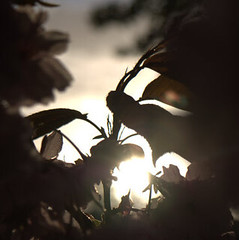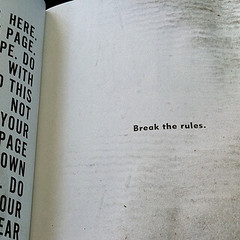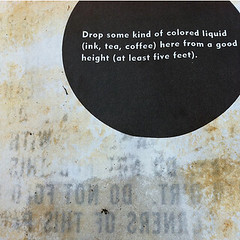The best in poetry (and poetic things), this week with Seth Haines.
1 Art
There is a split of authority in my house. I tend to identify with the poetry of William Carlos Williams—so much depends upon that red wheelbarrow. I imagine the objects of Williams’ poetry, perhaps attaching a bit of unwarranted sentimentality or nostalgia to them. But as for Amber, my wife and the true poet in the house? She could take him or leave him. It’s just not her style, she says.
I was immediately captivated by Williams’ poem “The Great Figure, ” which was evidently written after Williams watched a firetruck streak past him on a rainy Manhattan street. And as much as I like the poem, Charles Demuth’s visual representation of Williams’ work is even more captivating. In this article at the Wall Street Journal, the history of Demuth’s bold and stunning work, “The Great Figure Five, “ is explored. If you are a sucker for pieces exploring the intersection of art and literature, this article is for you.
And, as an aside, Amber and I are in full agreement about Demuth’s work. At least there’s that.
2 News
It’s been a blustery, snowy holiday season down in the south. So blustery, in fact, that my family was able to ice skate on the day after Christmas—on the highway, no less! But as bad as the roads were in Little Rock, this storm was nothing compared to the blizzard that hit the Great Plains in January of 1888. And if you live in Beatrice, Nebraska, visit the National Homestead Museum on January 12th to hear former United States Poet Laureate Ted Kooser read from his book of poetry, The Blizzard Voices. In his book, Kooser pens a series of poems based on the accounts of the survivors. If you attend, drop us a line and tell us all about it!
In other news, the Poetry Foundation recently announced that Poetry magazine editor, Christian Wiman, will be stepping down from the journal on June 30, 2013 to join the faculty of the Yale Institute of Sacred Music and Yale Divinity School. Wiman has been the editor at Poetry for over a decade, and his accomplishments are noteworthy. Read more about his transition at the Poetry Foundation website.
3 Publishing
“Print the best poetry written today in whatever style, genre or apprach.” These are the words of Harriet Monroe, founder of the Poetry journal. Now, in its one-hundredth year, Poetry is releasing The Open Door: One Hundred Poems, One Hundred Years of Poetry Magazine. Recently, the aforementioned Christian Wiman sat with Jeffrey Brown of PBS News Hour to discuss Poetry Magazine, Ezra Pound, form, substance, and the role of poetry in culture. This interview is one of the finest discussions of poetry I’ve watched in some time.
Watch 100 Years, 100 Poems: the Centennial for Poetry Magazine on PBS. See more from PBS NewsHour.
4 Poetry at Work
“His passion for nerdery didn’t just come out in design and technology, ” writes Esther Inglis-Arkell of Charles Babbage, who is widely regarded as the father of modern computing. Babbage, a stickler for precision, wrote a jocular, albeit utterly logical, correspondence critiquing Alfred, Lord Tennyson’s verse “Every moment dies a man, Every moment one is born.” What was his criticism? Evidently, Tennyson’s understanding of birth and death rates would lead to a stagnation in population growth. Ergo, Babbage employed his trade, suggesting a bit of a mathematical modification of the verse. What was the suggested revision? You can read Babbage’s suggested revision at io9.
Do you mix business and poetry like Babbage? If you do, consider joining us on January 15th for the first annual Poetry at Work Day. How do you participate? Visit our Poetry at Work Day post for more information.
5 Creativity
In this world of various media, I often find myself most creatively inspired by those who mix media in thoughtful, moving ways. Consider, for example, this poignant filmpoem, byAlastair Cook, featuring the poetry of Scott Edward Anderson.
6 Write-It
At Tweetspeak, we love encouraging you to write-it. And for some of you, the prompts here have given birth to good work. Do you want to take your poetry habit one step further? Consider joining Tweetspeak’s 2013 Poetry Workshop with Anne M. Doe Overstreet. For 12 weeks, you’ll be treated to an online classroom setting as Anne leads you through an exploration of poetic topics. Interested? Sign up now before the class fills up! Remember, space is limited!
Once you’ve completed the Tweetspeak workshop, perhaps you’ll have a body of work to submit for publication. But how will you know if your work is ready? This article by Jane Friedman explores just how to answer that question. In it, she explains those steps that hinder publication, how to recognize where you are on the publication path, and when it’s time to cut bait and move on.
7 Poems
Resolutions. We all made them, right? Some take these resolutions to new levels. Like this one from Jane Yolen. Yolen has resolved to write a poem a day, and to submit them to readers upon certain terms and conditions. In her first poem of the year, “Resolved:Combustion, ” she writes:
First find the right tinder,
a handful of dry grass,
the idea of the poem, piecemeal,
shaggy, rough, flaking in the hand.
To read the entire poem, or for more information about receiving her poems, visit the Huffington Post.
Yes, resolutions. John Blase puts his hand to them, too, although it’s not quite what you’d expect. In “But, ” he writes,
On January 1, 2013, I resolved not to cuss so much
but hell, that one went to shitsville before noon. I resolved
to not be so fussy when it comes to fiction but then
Louise Erdrich uses a phrase like ‘small-time hypocrites’
and I vowed once more that I shall keep my eyes from
worthless prose.
John, if by some stroke of fortune you are reading this article, you’ve put the fear of you-know-whom in me. I hope I never write worthless prose. And by the way, incredible poem.
8 People
Is there a more laudable position for a poet than Poet Laureate of the United States of America? Is there a more distinguished post, a more noble literary calling? It could be argued that there is not, so you can imagine my surprise when the New York Times reported that a petition has been circulating to award the position to a mountain goat.
Huh?
Reading more closely, I discovered that that the petition relates to John Darnielle, singer-songwriter and front-man for the folk-rock band the Mountain Goats. No doubt, Darnielle’s lyrics are rich, deep, and poetic. Consider the lyrics to their song, “Cotton, “:
This song is for the people
Who tell their families that they’re sorry
For things they can’t and won’t feel sorry for
And once there was a desk
And now it’s in a storage locker somewhere
And this song is for the stick pins and the cottons
I left in the top drawer
Let ’em all go
Let ’em all go
For more on this interesting (and perhaps irreverent) petition, visit the Arts Beat of The New York Times.
And if you can’t get behind the thought of having a Mountain Goat as your next Poet Laureate, perhaps you would consider starting a petition to name Peleg Top as Natasha Trethewey’s successor. Top, a resident of Silver Lake California, had a grand idea to spread his love for language and poetry. Placing a poetry box in his front yard, Top distributed copies of his work for free. The poetry has inspired others to create their own works and to share their love of poetry with their neighbors. For more, check out these two separate articles written for the Los Angeles Times.
9 Books
Perhaps like Charles Babbage, your “nerdery” knows no bounds. If so, might I suggest what is soon to become your favorite site on the internet? Check out the “Classics” page of the Nerd’s Guide to Reading. Here you’ll find the 25 classics every nerd should read. Scroll through the list and let us know how many you’ve read. More than 80% results in a very high nerd quotient.
Speaking of classics (not of nerd quotients, mind you), have you checked out Karen Swallow Prior’s new title, Booked? In this memoir, Prior “draws on classics like Great Expectations, delights such as Charlotte’s Web, the poetry of Hopkins and Donne, ” to express the idea that a life filled with books is a life filled with soul. Grab your copy and read along!
10 Sound n Motion
The good folks at Mission Local showcase the sing-song recitation of A.D. Winans’ poem, “The System.” Enjoy.
Cover photo by InaFrenzy. Creative Commons license via Flickr. Article photos by Claire Burge. Used with permission. Post by Seth Haines.
__________________
Buy a year of Every Day Poems, just $2.99— Read a poem a day, become a better writer. In December we’re exploring the theme Haiku.
- Become a Better Writer: Fly Fishing Artist Date - June 6, 2014
- No Cat Poetry for Fierce Dog Lovers - November 22, 2013
- Exploring Poetry: Penning a Ghazal - October 18, 2013











Maureen Doallas says
I also enjoyed Wiman’s talk with Jeffrey Brown. If you haven’t heard his conversation with Bill Moyers, do listen. It’s wonderful, too.
The Cook filmpoem reminds me of Swoon’s work. Haunting in its way.
Thank you for the Yolen link. I’ve read a lot of her work but had lost track of anything recent. I think she’s a wonderful writer.
Happy New Year, Seth!
John says
Thank you, Seth.
I’m thrilled to see Anne is offering the workshop, and thanks for the Friedman link (I’m asking that question).
Monica Sharman says
Did you say Jane Yolen?! I love Jane Yolen!
Elizabeth Wynne Marshall says
Thank you for another great post. Can’t wait to go running off on all the wondrous rabbit trails here. Where to start? This is rich and deep and full. Thanks Seth.
Seth Mouk says
If I were you… I’d suggest starting with the filmpoem. Whoa…
Lexanne Leonard says
What a great way to start the new year. Both The System and the filmpoem are powerful pieces. Thank you for finding such jewels.